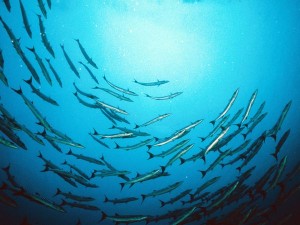From our discussion of ‘The Dwelling Place of God’, on February 19
Carol McPhee contributes ‘Prayer’, by Jorie Graham
Prayer first appeared as a millennium poem in the New York Times. I read it online then and have read it over and over again for years because it’s the kind of prayer I like, one that is a philosophical meditation on the nature of God and our relationship with Her.
Prayer makes a good accompaniment to Johnson’s Chapter 5 in Ask the Beasts for two reasons: it uses the metaphor of flowing water for God, illustrating God’s interpenetration with all creation; and it describes the natural world as existing through participation in God’s active force of being or self-giving love in a way similar to Johnson’s description of what Thomas Aquinas, the great Catholic medieval theologian, proposed.
In Prayer the poet tells us she’s watching minnows, each moving as a tiny muscle to make of the whole group a “visual current.” But this visual current is itself given being by a real current of water “mostly invisible.” Johnson, explaining Aquinas’s concept of God, tells us that each creature is dependent on the Creator, that the Creator (the primary cause) is its source and principle of being and though each creature is an agent in itself (a secondary cause) it cannot affect the Creator. Just so, in the poem, the visual current, the school of minnows, acts according to its own nature, yet cannot “freight or sway by/ minutest fractions the water’s downdrafts and upswirls.” The motion of the creator current “forces change–/this is freedom. This is the force of faith.” Then the poet moves on to contemplate human longing, the wind blowing away all that is saved of life, and at the end, her own finiteness.
Prayer
by Jorie Graham
Over a dock railing, I watch the minnows, thousands, swirl
themselves, each a minuscule muscle, but also, without the
way to create current, making of their unison (turning, re-
infolding,
entering and exiting their own unison in unison) making of themselves a
visual current, one that cannot freight or sway by
minutest fractions the water’s downdrafts and upswirls, the
dockside cycles of finally-arriving boat-wakes, there where
they hit deeper resistance, water that seems to burst into
itself (it has those layers), a real current though mostly
invisible sending into the visible (minnows) arrowing
motion that forces change—
this is freedom. This is the force of faith. Nobody gets
what they want. Never again are you the same. The longing
is to be pure. What you get is to be changed. More and more by
each glistening minute, through which infinity threads itself,
also oblivion, of course, the aftershocks of something
at sea. Here, hands full of sand, letting it sift through
in the wind, I look in and say take this, this is
what I have saved, take this, hurry. And if I listen
now? Listen, I was not saying anything. It was only
something I did. I could not choose words. I am free to go.
I cannot of course come back. Not to this. Never.
It is a ghost posed on my lips. Here: never.
NOTES: Prayer (“minnows”) was written as a turn-of-the-millennium poem
for the New York Times Op-Ed page, and was originally dated 12.31.00
Jorie Graham, “Prayer” from Never. Copyright © 2002 by Jorie Graham.
Used with the permission of HarperCollins Publishers.
To see the poem’s original formatting, go to
http://www.poetryfoundation.org/poem/176600

